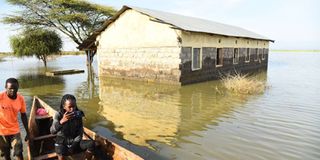Fight climate change with good education, right from primary

Nosukuro Primary School, one of the schools submerged by the rising water of Lake Baringo, on October 14, 2020. Learners in the school and many others do not have a place to learn as schools prepare to reopen on January 4, 2021.
What you need to know:
- Climate change has destabilised both natural and human systems.
- Locally, we have experienced floods, change in rainfall patterns, droughts, heat waves and increase in temperatures.
As the world gears towards the 26th UN Climate Change Conference of Parties, COP26, later in the year, we must begin asking pertinent questions regarding how holistic and inclusive the war against climate change has been.
Particularly, we must begin to make assessments of what has been done and what can be done with regards to the role of education in combating climate change.
In retrospect, whether knowingly or naively, we have all experienced the effects of climate change — an outcome of greenhouse gas emissions, which causes global warming.
Climate change has destabilised both natural and human systems. Locally, we have experienced floods, change in rainfall patterns, droughts, heat waves and increase in temperatures.
Have Kenyan curricula addressed how we can curb climate change? The Kenya Climate Change Act of 2016 gives precedence to development, management, implementation and regulation of mechanisms to enhance climate change resilience and low carbon development for sustainable development.
The 2010 National Climate Change Response Strategy (NCCRS) was supposed to address climate change issues such as Communication, education and awareness.
As of May 2020, the Ministry of Environment and Forestry, in collaboration with the Ministry of Education, recognised that a formidable emissions gap remains between the aspirational goals of the Paris Agreement and the real-world pledges and actions is still a challenge.
Both ministries also appreciate that closing the emissions gap can be achieved if the education gap between scientific and societal understanding of climate change is also closed.
Strong political commitment
The United Nations Framework Convention on Climate Change (UNFCCC) advocates that there is need for improving awareness and understanding of climate change.
That there’s need for creating solutions to facilitate access to information on a changing climate to win public support for climate-related policies.
UNFCCC through its Article 6, has been rallying all governments to educate, empower and engage all stakeholders and major groups on policies relating to climate change. This call, according to the convention, has been echoed by Article 10e of the Kyoto Protocol as well as the Article 12 of the Paris Agreement.
Climate change effects
Kenya submitted its Nationally Determined Contribution to UNFCCC in December 2020. As part of the mitigation process, the proposal shows that Kenya’s approach to curbing climate change will be an all-society action plan.
The proposal leaves a lot to be desired on the role and contribution of education enhancing adaptive capacity in fighting climate change locally.
While appreciating this fact, we must be cognisant of the fact that climate change is also affecting our education system. Enrolment of pupils is low in areas that are faced with harsh climate change effects.
It’s believed that failure to adequately meet basic needs, such as clean water, food, and shelter, among others, is also leading to low enrolment and poor school attendance.
Conflicts for pastures and water sources among nomadic communities stop learners from going to school. Education has been championed as suitable for enhancing climate change knowledge among the youth.
At a young age, children have the ability to grasp, internalise the effects of global warming and further contribute to measures of adapting and mitigating climate change. Curriculum developers ought to design syllabi that encompass understanding of the climate systems.
We hope stakeholders spearheading climate change initiatives will continue to encourage, invest more and enhance real-time approaches to integrate realistic climate change education for sustainable development, approaches that will be interdisciplinary, cross-cutting and whole-school. In addition, there must a stronger political commitment and goodwill across all stakeholders to mainstream climate change into Kenya’s curricula.
The importance of education for sustainable development cannot be gainsaid. Kenya’s free primary and subsidised secondary education is a progressive system. Like other studies that have been progressively integrated into the education system, integrating climate change content into curricula is now more than ever, inevitable.
There’s need for all relevant stakeholders to develop frameworks and policies that will equip the young people with an understanding and consequences of global warming for them to adapt accordingly.
Failure to intentionally do this poses the danger of bringing up a generation that lacks proper knowledge of climate change — which is already a global emergency. We need to build capacity and skills, promote behaviour change and raise a climate change-ready generation.
The authors are Nairobi-based climate change advocates. [email protected]; [email protected]





